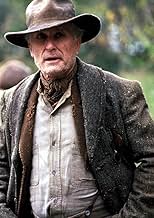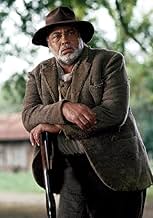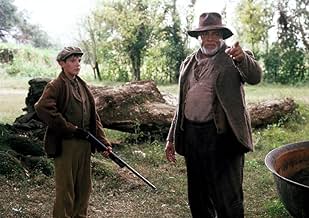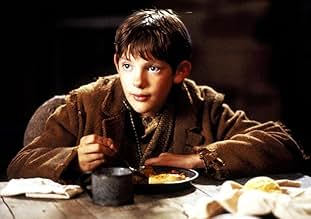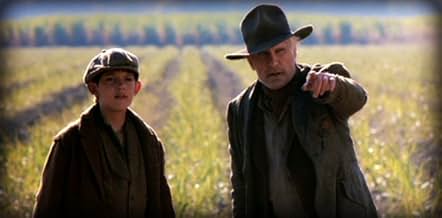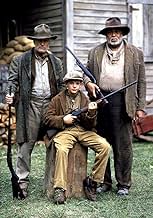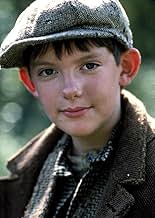Adicionar um enredo no seu idiomaHorton Foote's story of a teen-aged boy in the Depression who finds work on an eccentric's sugar plantation and learns life's surprising lessons from the team of convicts who also work there... Ler tudoHorton Foote's story of a teen-aged boy in the Depression who finds work on an eccentric's sugar plantation and learns life's surprising lessons from the team of convicts who also work there.Horton Foote's story of a teen-aged boy in the Depression who finds work on an eccentric's sugar plantation and learns life's surprising lessons from the team of convicts who also work there.
Bob Edmundson
- Overseer
- (as Robert Edmundson)
Enredo
Você sabia?
- Erros de gravaçãoWhen Soll thinks he hears someone in the closet he shoots three times and we see three bullet holes. But when Jackson opens the closet door to investigate, there are four holes.
- Citações
Horace Robedaux: Martha, are you afraid of dying?
Martha Johnson: No, I ain't afraid. Just not ready to go yet.
- Trilhas sonorasGolden Slippers
Sung by Jackson
Avaliação em destaque
My review was written in November 1991 after watching the film at a Manhattan screening room.
Robert Duval adds another memorable character to his screen portfolio in Horton Foote's "Convicts", a static, uncinematic play to film adaptation. Despite good supporting turns, the feature is strictly for Foote fetishists.
Given Duvall's stature and his quality work here it makes sense that 18 months-on-the-shelf pic is getting an Oscar qualifying run. Financial problems of its distributor MCEG account for the tardy release.
Foote has provided Duvall with some of his best screen roles, including the Faulkner adaptation "Tomorrow" and "Tender Mercies". Simpatico "Convicts" team also includes director Peter Masterson, who acted in "Tomorrow" and directed Foote's "The Trip to Bountiful"; and producer Sterling Van Wagenen, who made his directorial debut several months after this picture with "Convicts" co-star Lukas Haas starring in "Alan & Naomi". And Haas re-teamed a bit larger with Duvall to great effect in "Rambling Rose".
Unfortunately "Convicts", the second play in a nine-play cycle Foote calls "The Orphan's Home", does not present the sort of material suitable for modern film audiences. It might have worked best in the special interest format of Ely Landau's "American Film Theater" adaptations of the early 1970s.
Set on Texas's Gulf Coast on Christmas Eve in 1902 (actually lensed on Louisiana locations), "Convicts" is told through the observations of 13-year-old Haas, working in a country store on Duvall's sugar cane plantation. Many year's back, the land's tenant farmers were dismissed and convicts were contracted for low-cost labor replacements -not unlike the original slavery system.
Civil War veteran Duvall runs the farm but is senile, his affliction allowing Foote to out-Pinter Harold Pinter in dialog repetition. Duvall's interpretation is dead-on, as he continually asks Haas and anyone else in earshot the same inane questions to ultimately yield comic relief.
Presented without much continuity in elliptical vignettes, the story does not have a cumulative, dramatic narrative. Instead, various forms of cryptic behaviors are observed via Haas' eyes. Haas is trying to earn enough money to buy a headstone for his late father's unmarked grave and Duvall, making accelerating promises of wealth to Haas, gradually takes the boy under his wing.
The convicts of the title die of overwork or are shot to death 'escaping' almost randomly, with director Masterson emphasizing their symbolic function in the story by not explaining why. Duvall is so absentmnded he keeps asking if a specific convict is a Negro, and hnas to be reminded that they all are.
All the adult white people in the cast are constantly drunk, including Duvall's relatives Carlin Glynn and Gary Swanson, who loll around the house aimlessly. Foote's portrait of a decadent society on its last legs will not please Southerners but is vividly realized in microcosm here.
Haas, as in "Rambling Rose", provides impressive naturalism to balance Duvall's barnstorming performance. James Earl Jones is also quite understated, and besides Mel Winkler's convincing period portrayal, there is a powerfully modern, almost militant turn by Calvin Levels as a convict in chains who tells his sad story to Haas.
Toyomichi Kurita's frequently backlit photography captures the atmosphere of the place but the location shooting fails to disguise the story's theatrical origins.
Robert Duval adds another memorable character to his screen portfolio in Horton Foote's "Convicts", a static, uncinematic play to film adaptation. Despite good supporting turns, the feature is strictly for Foote fetishists.
Given Duvall's stature and his quality work here it makes sense that 18 months-on-the-shelf pic is getting an Oscar qualifying run. Financial problems of its distributor MCEG account for the tardy release.
Foote has provided Duvall with some of his best screen roles, including the Faulkner adaptation "Tomorrow" and "Tender Mercies". Simpatico "Convicts" team also includes director Peter Masterson, who acted in "Tomorrow" and directed Foote's "The Trip to Bountiful"; and producer Sterling Van Wagenen, who made his directorial debut several months after this picture with "Convicts" co-star Lukas Haas starring in "Alan & Naomi". And Haas re-teamed a bit larger with Duvall to great effect in "Rambling Rose".
Unfortunately "Convicts", the second play in a nine-play cycle Foote calls "The Orphan's Home", does not present the sort of material suitable for modern film audiences. It might have worked best in the special interest format of Ely Landau's "American Film Theater" adaptations of the early 1970s.
Set on Texas's Gulf Coast on Christmas Eve in 1902 (actually lensed on Louisiana locations), "Convicts" is told through the observations of 13-year-old Haas, working in a country store on Duvall's sugar cane plantation. Many year's back, the land's tenant farmers were dismissed and convicts were contracted for low-cost labor replacements -not unlike the original slavery system.
Civil War veteran Duvall runs the farm but is senile, his affliction allowing Foote to out-Pinter Harold Pinter in dialog repetition. Duvall's interpretation is dead-on, as he continually asks Haas and anyone else in earshot the same inane questions to ultimately yield comic relief.
Presented without much continuity in elliptical vignettes, the story does not have a cumulative, dramatic narrative. Instead, various forms of cryptic behaviors are observed via Haas' eyes. Haas is trying to earn enough money to buy a headstone for his late father's unmarked grave and Duvall, making accelerating promises of wealth to Haas, gradually takes the boy under his wing.
The convicts of the title die of overwork or are shot to death 'escaping' almost randomly, with director Masterson emphasizing their symbolic function in the story by not explaining why. Duvall is so absentmnded he keeps asking if a specific convict is a Negro, and hnas to be reminded that they all are.
All the adult white people in the cast are constantly drunk, including Duvall's relatives Carlin Glynn and Gary Swanson, who loll around the house aimlessly. Foote's portrait of a decadent society on its last legs will not please Southerners but is vividly realized in microcosm here.
Haas, as in "Rambling Rose", provides impressive naturalism to balance Duvall's barnstorming performance. James Earl Jones is also quite understated, and besides Mel Winkler's convincing period portrayal, there is a powerfully modern, almost militant turn by Calvin Levels as a convict in chains who tells his sad story to Haas.
Toyomichi Kurita's frequently backlit photography captures the atmosphere of the place but the location shooting fails to disguise the story's theatrical origins.
- lor_
- 29 de jun. de 2023
- Link permanente
Principais escolhas
Faça login para avaliar e ver a lista de recomendações personalizadas
- How long is Convicts?Fornecido pela Alexa
Detalhes
- Data de lançamento
- País de origem
- Idioma
- Também conhecido como
- Horton Foote's Convicts
- Locações de filme
- Empresa de produção
- Consulte mais créditos da empresa na IMDbPro
Bilheteria
- Faturamento bruto nos EUA e Canadá
- US$ 13.623
- Fim de semana de estreia nos EUA e Canadá
- US$ 6.347
- 8 de dez. de 1991
- Faturamento bruto mundial
- US$ 13.623
Contribua para esta página
Sugerir uma alteração ou adicionar conteúdo ausente


